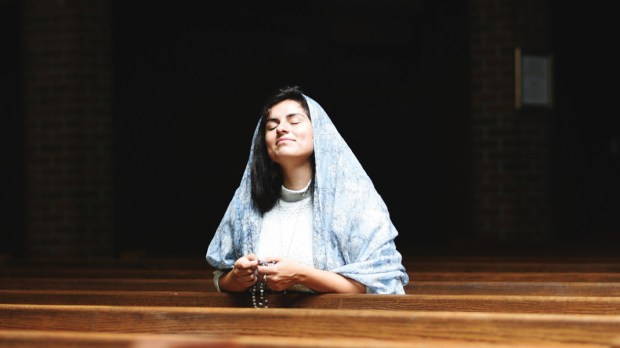Now the people were filled with expectation, and all were asking in their hearts whether John might be the Christ. John answered them all saying, “I am baptizing you with water, but one mightier than I is coming. I am not worthy to loosen the thongs of his sandals. He will baptize you with the Holy Spirit and fire. His winnowing fan is in his hand to clear his threshing floor and to gather the wheat into his barn, but the chaff he will burn with unquenchable fire.” Exhorting them in many other ways, he preached good news to the people.—Luke 3:15-18
On this Third Sunday of Advent, the Church gives us a very particular mandate: Rejoice! And, during these pre-Christmas days, it seems that there is joy all around us. And yet, the essayist William Stringfellow makes a poignant observation that should give us pause: “For the greeting card sentiment and sermonic rhetoric, I do not think that much rejoicing happens around Christmastime, least of all about the coming of the Lord. There is, I notice, a lot of holiday frolicking, but that is not the same as rejoicing. In any case, maybe the outbursts of either frolicking and rejoicing are premature, if John the Baptist has credibility. He identifies repentance as the sentiment of Advent” (from Advent as a Penitential Season).
The themes of judgment, repentance, and salvation that emerge in this Sunday’s Gospel seem to be at odds with the spirit of Christian joy to which we are also called on this Gaudete Sunday. John the Baptist, the prophet par excellence, announces the coming of the Christ, calling his hearers to lead lives worthy of the new age of the Messiah: Give up extortion and avarice and begin sharing with those who are in need. In short, manifest your interior faith through works of charity, peace, and justice.
How can we reconcile these seemingly disparate ideas of repentance and joy? To find an answer to this question, we have to keep in mind that the One who is to come is, in the words of Thomas Merton, “more than a charming smiling infant in the straw.”
In Advent we celebrate both the coming and the presence of Christ in the world. This demands a certain response on our part—conversion and living lives worthy of his Kingdom—but we can also rejoice because he is present among us, even in the midst of all the problems, trials, and tragedies that seem to overwhelm our world today.
What we prepare to commemorate at Christmas has actually happened: God is in our midst. This truth calls for more than some sort of vaguely defined “cheery” disposition for Christians. Rather, the radical joy that this Gaudete Sunday calls for is grounded in the confidence that, although hell might be breaking out all around us, the Lord has come—and will come—to set us free.
John’s clarion call for repentance is an invitation for us to acknowledge the presence of Christ among us now and to live accordingly. And so, our Advent-hope and joy are not only focused on the approach of Christmas Day. Rather, we rejoice because God has kept his promises through the ages and has given us love, mercy, and truth in Jesus: “The Lord, your God, is in your midst, a mighty savior; he will rejoice over you with gladness, and renew you in his love, he will sing joyfully because of you, as one sings at festivals” (Zephaniah 3:17-18a).
John’s followers were inspired to ask “What should we do?” What do you hear God asking you to do today? What are some concrete actions you can take to make the remaining days of Advent a time of joy-filled expectation?How do you share the joy of Christ’s presence with others?
Words of Wisdom: “We read in John: ‘He himself was not the light, but he came to testify to the light.’ We missioners, when we open our eyes and our hearts to the presence of God that surrounds us in the communities where we live, are called to be witnesses to the light that we find there. We proclaim the good news that God is truly among us, in the wisdom and resilience and tenacity of the peoples of the world who have had to fight to stay alive, who are working to reclaim their sacred traditions and language after centuries of conquest, who are trying to create security for themselves and their families in cruel dynamics of the global economy …
“To be in mission is to find a thousand ways to say, ‘You are beautiful, you are wise and powerful, your ways are wonderful, you are marvelous just as God made you.’ The good news we proclaim is that those we encounter in mission can show us a path to peace and to our shared salvation.”—Maggie Fogerty, “Christmas Time in Bolivia,” in Goodness and Light: Readings for Advent and Christmas

